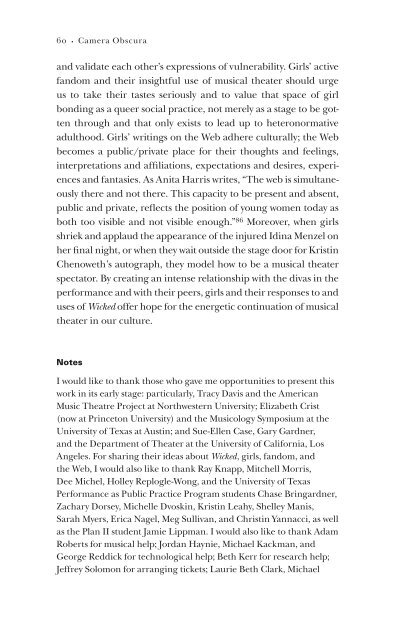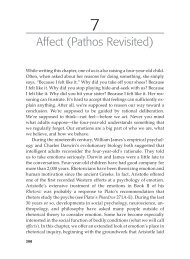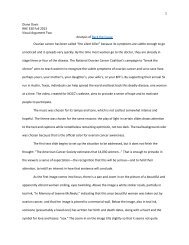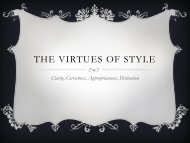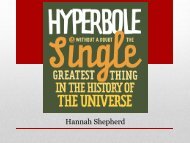(Kristin Chenoweth) and Elphaba - Camera Obscura: Feminism ...
(Kristin Chenoweth) and Elphaba - Camera Obscura: Feminism ...
(Kristin Chenoweth) and Elphaba - Camera Obscura: Feminism ...
- No tags were found...
You also want an ePaper? Increase the reach of your titles
YUMPU automatically turns print PDFs into web optimized ePapers that Google loves.
60 • <strong>Camera</strong> <strong>Obscura</strong><br />
<strong>and</strong> validate each other’s expressions of vulnerability. Girls’ active<br />
f<strong>and</strong>om <strong>and</strong> their insightful use of musical theater should urge<br />
us to take their tastes seriously <strong>and</strong> to value that space of girl<br />
bonding as a queer social practice, not merely as a stage to be gotten<br />
through <strong>and</strong> that only exists to lead up to heteronormative<br />
adulthood. Girls’ writings on the Web adhere culturally; the Web<br />
becomes a public/private place for their thoughts <strong>and</strong> feelings,<br />
interpretations <strong>and</strong> affiliations, expectations <strong>and</strong> desires, experiences<br />
<strong>and</strong> fantasies. As Anita Harris writes, “The web is simultaneously<br />
there <strong>and</strong> not there. This capacity to be present <strong>and</strong> absent,<br />
public <strong>and</strong> private, reflects the position of young women today as<br />
both too visible <strong>and</strong> not visible enough.” 86 Moreover, when girls<br />
shriek <strong>and</strong> applaud the appearance of the injured Idina Menzel on<br />
her final night, or when they wait outside the stage door for <strong>Kristin</strong><br />
<strong>Chenoweth</strong>’s autograph, they model how to be a musical theater<br />
spectator. By creating an intense relationship with the divas in the<br />
performance <strong>and</strong> with their peers, girls <strong>and</strong> their responses to <strong>and</strong><br />
uses of Wicked offer hope for the energetic continuation of musical<br />
theater in our culture.<br />
Notes<br />
I would like to thank those who gave me opportunities to present this<br />
work in its early stage: particularly, Tracy Davis <strong>and</strong> the American<br />
Music Theatre Project at Northwestern University; Elizabeth Crist<br />
(now at Princeton University) <strong>and</strong> the Musicology Symposium at the<br />
University of Texas at Austin; <strong>and</strong> Sue-Ellen Case, Gary Gardner,<br />
<strong>and</strong> the Department of Theater at the University of California, Los<br />
Angeles. For sharing their ideas about Wicked, girls, f<strong>and</strong>om, <strong>and</strong><br />
the Web, I would also like to thank Ray Knapp, Mitchell Morris,<br />
Dee Michel, Holley Replogle-Wong, <strong>and</strong> the University of Texas<br />
Performance as Public Practice Program students Chase Bringardner,<br />
Zachary Dorsey, Michelle Dvoskin, <strong>Kristin</strong> Leahy, Shelley Manis,<br />
Sarah Myers, Erica Nagel, Meg Sullivan, <strong>and</strong> Christin Yannacci, as well<br />
as the Plan II student Jamie Lippman. I would also like to thank Adam<br />
Roberts for musical help; Jordan Haynie, Michael Kackman, <strong>and</strong><br />
George Reddick for technological help; Beth Kerr for research help;<br />
Jeffrey Solomon for arranging tickets; Laurie Beth Clark, Michael


